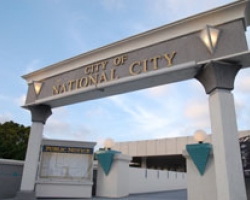Members of the Filipino-American and Asian Pacific Islanders communities are holding a rally at Market on 8th from 10-10:30 a.m. on Dec. 4 to generate interest in their demand that the city adopt district-based voting.
“On Saturday, we’re there to educate the attendees on why it’s important to adopt district voting in National City. We’re there to reinforce the vision we have for the community, and equitable voting rights in the city and to encourage people to support this cause,” key organizer Audie de Castro said.
The upcoming rally is a first public step, de Castro said, but he has already privately approached the city attorney’s office with a request for officials to adopt a resolution converting the city from at-large elections in which every resident can vote for anyone running for city council, to a district-based system in which the city would be broken up into voting blocks based on geographic lines.
De Castro said he anticipates pushback on the idea, expects that elected leaders and residents might question the need for districts in a city with just 61,000 residents, but believes the reasoning behind districting is strong, regardless of geography.
“I know precisely what some are going to say and my response is ‘look at Solana Beach, it’s what, three miles? Imperial Beach is just four miles’,” de Castro said.
Imperial Beach transitioned to district-based voting in 2020 with 27,000 residents voting in one of four districts for a representative city council member and a citywide, at-large vote for Mayor. Solana Beach, with a population of 13,000 recently approved a similar structure.
Both municipalities are roughly half the geographical size of National City, which covers about nine square-miles.
Although National City has had Filipino-American candidates run for local office, most recently Lorna de los Santos and Ditas Yamane in the 2020 election, de Castro believes their campaigns were actually less favorable by having two candidates essentially running for the same vote.
“I think you can run but that doesn’t mean you have a reasonable opportunity to win… It’s not that we don’t have an opportunity to run, we don’t have an opportunity to have any influence on city hall,” de Castro said.
He and other organizers would like to see the city geographically split so there are as many residents as possible able to stack their vote toward one Filipino-American candidate. Ideally, he said, one district would encompass “the Northeastern part of National City where most of the Filipino voters reside and run businesses” and would stretch as far as Plaza Blvd. and 8th Street.
“A lot of Filipinos live near El Toyon park and East Plaza Boulevard. is dominated by Filipino businesses and outside investors from the Philippines,” de Castro said.
De Castro said the group would consider a lawsuit if their demand for districting is not met.
He expects the event to draw about 100 residents.

